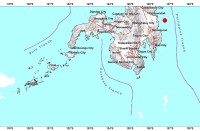
(Reuters) — Filipino activists protested in front of the Chinese consular office in Manila on Monday (March 3), condemning Chinese vessels’ use of water cannon on Filipino fishermen.
On January 27, a Chinese coast guard ship tried to drive away Filipino fishermen from Scarborough Shoal by using a water cannon, the head of the Philippine military said last week. The Philippine foreign ministry has lodged a formal protest.
The activists said the action was unlawful, an act of aggression, and a violation of Philippine sovereignty.
“We believe it is a clear act of aggression from an outright intruder. It is already bad that China is again infringing on Philippine sovereignty. But what makes this incident more despicable and revolting is that, they’re not only infringing on Philippine sovereignty, they’re also committing acts of violence and harassment against Filipino fishermen, that were only undertaking fishing activities, within their right as Filipino nationals,” said Emman Hizon, secretary-general of left-leaning group Akbayan (Arm To Rest On).
Hizon said Chinese maritime vessels had no right to exercise control in Scarborough Shoal, known locally as Panatag Shoal, which lies about 130 nautical miles west of Zambales province. It is located well within the Philippines’ 200-nautical mile Exclusive Economic Zone, a UN-mandated maritime convention.
Akbayan called on President Benigno Aquino not to negotiate on Philippine sovereignty, and reject any offers of incentives such as investments reportedly being offered by China in exchange for a delay in taking their objections to an international tribunal.
“The Filipino people will reject any offers of incentives from China in exchange of withdrawing our formal case in the International Tribunal on the Law of the Sea (ITLOS). We believe this is an indication of China’s weakness, and desperation, and in fact, insecurity against our case before the ITLOS,” Hizon said, calling it a carrot-and-stick tactic.
The Philippines has a deadline of March 30 to submit its case to the Permanent Court of Arbitration at The Hague after filing an initial complaint in January 2013. Its U.S. and British lawyers are finalising submissions to try to prove China’s claims are invalid under the U.N. Law of the Sea. China has refused to participate in the matter.
Dressed as clowns and armed with water guns, the protesters mocked China’s “nine-dash” claim to the South China Sea as outrageous and comical.
China claims about 90 percent of the South China Sea’s 3.5 million sq km (1.35 million sq mile) waters. The sea provides 10 percent of the global fish catch, carries $5 trillion in ship-borne trade a year and is believed to be rich in energy.
Taiwan, Malaysia, the Philippines, Brunei and Vietnam also claim parts of the sea.







